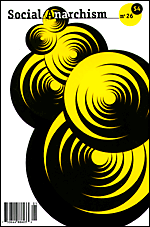Dear Social Anarchism
Your Number 25, 1998 issue in the essay, "The Promise of Deschooling" Matt Hern lists many of the deficiencies of the public schools. His criticisms are, in general, valid and similar to those described in detail by many others.
He also also states: "…it is a critical deschooling project to carefully define schooling, education and learning." (p. 20) and then offers definitions that can only be described as gross distortions and caricatures. The essential term, education, receives the most distortion and he quotes others who have also never understood the term. "Education is all about the centralization of control…" (p. 21), "the manipulative and debilitating effects of education." (p. 21), "[t]he renunciation of education is imperative for the creation of a (sic) ecologically sane, decentralized and directly democratic society." (p. 22), "…schooling and education are destructive forces across the board" (p. 22).
We must admit that the media and even scholarly books have applied the term "education" to a host of practices that are in no way educational. Institutions that incorporate all the practices he criticizes are frequently called "educational institutions." And school administrators who are nothing more than former coaches placed in administrative positions because they won the ball games are frequently called "educators."
But we should remember that the term "education" has a definite professional meaning and definition. Education means, to those who study and research it as a serious profession: a change in behavior. In this context, education is that complexity of behavioral changes by which the totally dependent, irresponsible, self-centered, demanding, dictatorial and capricious small child becomes the responsible, socially conscious, creative, independent and humane adult capable of solving the problems of life and society. Someone has described the newborn infant as "a psychotic with a good prognosis." Education is the complex sum of changes in behavior that transforms this psychotic into a sane, responsible, humane and creative adult. The task of education was never easy. It requires dedicated effort and unfortunately has not always been fully successful. But we have all undergone much of this change in behavior which is an essential elementary characteristic of the human species. To advocate the "renunciation of education" (p 22) is to advocate the renunciation of our humanity.
To renounce and reject education is to throw the baby (education) out with the bathwater (the deficiencies and unproductive practices found in many schools).
From the above it becomes obvious that most of what happens in the schools, public, private and otherwise is not education. Most of what goes on in the schools is more accurately described as pedagogical processing. Our universities, Harvard, Ivy League and others, are little more than pedagogical processing plants in which students pay to be processed into graduates with the skills, attitudes and opinions (not to mention the proper social graces) that will assure a secure status position in society. Kindergartens practice more actual education than the universities. Matt Hern, like many others, confuses education with the worst aspects of public school processing.
Why is understanding the definition important? If we are ever to build a sane, humane and creative society we will have to understand how behavior changes. Changing the world of human society means changing our behavior. And that behavioral change is education. The media has long been distorting the meanings of basic and essential terms such as "democracy," "communism," "socialism," "anarchism," and "capitalism." It is not responsible behavior to join the media in distorting a term as basic and essential as that of education.
Sincerely,
Lynn Olson

